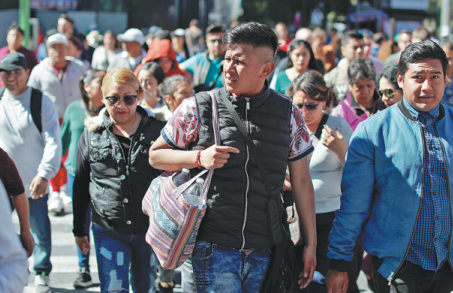MEXICO CITY-For centuries, Mexico City residents brought warm tortillas home in reusable cloths or woven straw baskets, and toted others foods in conical rolls of paper, "ayate" mesh or net bags, or even string bundles.
People in Mexico's massive capital city may have to return to those old ways after a new law took effect banning the plastic bags that became ubiquitous over the last 30 years. Some say they are ready and willing, and grocery stores are promising to promote reusable synthetic fiber bags, but others are struggling to get their minds around how the ban will work in practice.
"We have a very rich history in ways to wrap things," said Claudia Hernandez, the city's director of environmental awareness. "We are finding that people are returning to baskets, to cucuruchos," she said, referring to cone-shaped rolls of paper once used to wrap loose bulk goods like nuts, chips or seeds.
Some Mexico City residents still use traditional ayate bags, or tortilla towels or baskets, and many-especially the elderly-pull two-wheeled, folding shopping baskets through grocery stores. Some merchants still use old sardine cans to measure out bulk goods.
Under the new law, grocery stores will be fined if they give out plastic bags. Most will offer reusable shopping bags made of thick plastic fiber, usually selling them for 75 cents.
"They are not giving them away, they are selling them, and that is what I don't agree with," said city subway worker Ernesto Gallardo Chavez, who wonders what will happen if he goes grocery shopping after Jan 1 and forgets to bring his reusable bags.
"Just imagine, I forget my bag and I buy a lot of stuff," said Gallardo Chavez. "How do I carry it all, if they don't give you bags anymore?"
Like most city residents, Gallardo Chavez thinks protecting the environment is "very good." But plastic bags in Mexico City are almost never really single-use: most city residents have bought garbage cans and waste paper baskets just the right size to be lined with supermarket bags. And the bags are commonly used to clean up after dogs on sidewalks.
"We use the bags for garbage, to separate it into organic and inorganic, and then take it out to the garbage truck," he notes.
Hernandez, the environment official, said people should get out of the habit of putting their garbage in plastic bags. "They can take it out (to the garbage truck) directly in garbage cans."
But that is complicated given the city's stubborn water shortages. It's all very well to tell city residents not to line their trash cans with plastic bags, but washing out a kitchen receptacle every couple of days after use because it doesn't have a plastic liner will takes its toll on water supplies.
Not to mention the widespread habit of tossing used toilet paper into wastepaper baskets to spare the strain on many homes' aged and insufficient plumbing. Used toilet paper is not the kind of thing you can turn over loose to the trash collector.
Data analysis specialist Daniel Loredo says he is planning to hoard his last remaining plastic shopping bags precisely for that purpose.
But he and his roommates have already taken steps to build up a supply of reusable bags and make sure whoever goes to the grocery store is carrying a few. But for poorer city residents, forgetting to do so even one day could carry a high price in a country where the 75-cent reusable bag costs the equivalent of an hour's worth of the minimum wage.
"I think this will be a challenge, because these bags represent an additional cost, and maybe not everyone can bear that cost quite as easily," Loredo said.

